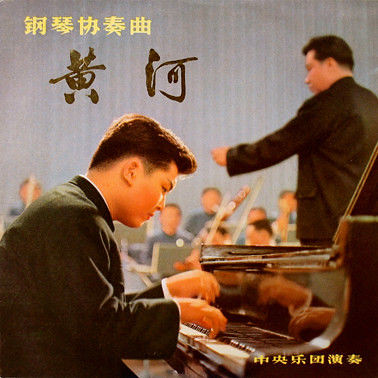 Many the disgruntled claimed that Mr. Lang has always been eager to participate in performing art as propaganda, despite his protest that he was only a musician. One piece of Chinese music he loved to play was the Yellow River Piano Concerto.
Many the disgruntled claimed that Mr. Lang has always been eager to participate in performing art as propaganda, despite his protest that he was only a musician. One piece of Chinese music he loved to play was the Yellow River Piano Concerto.Yellow River ConcertoThe Yellow River Piano Concerto is a piano concerto arranged by a collaboration between musicians including Yin Chengzong and Chu Wanghua, and based on the Yellow River Cantata by composer Xian Xinghai. The Yellow River Cantata, written in 1939 during the Sino-Japanese War (1937-1945), is an eight-movement piece in which Xian used traditional folk-melodies and evoked the image of the Yellow River as a symbol of Chinese defiance against the Japanese invaders.
Under orders of Madame Mao, a collective of musicians from the Central Philharmonic Society including Yin Chengzong, Liu Zhuang, Chu Wanghua, Sheng Lihong, Shi Shucheng, and Xu Feixing rearranged the cantata into a four-movement piano concerto. In the fourth movement, following a recapitulation of the theme of "Defending the Yellow River" played canonically against the strings came the climatic tutti of "The East is Red", a song with lyrics like this:
The east is red, the sun is rising.
China has brought forth a Mao Zedong.
He works for the people's welfare.
Hurrah, He is the people's great savior!
(Repeat last two lines)
Chairman Mao loves the people.
He is our guide
To build a new China.
Hurrah, he leads us forward!
(Repeat last two lines)
The Communist Party is like the sun.
Wherever it shines, it is bright.
Wherever there is a Communist Party,
Hurrah, there the people are liberated!
(Repeat last two lines)
Then the first phrase of "The East is Red" is played by the trumpet, and tightly followed by the final phrase of the Internationale.
Below video was a performance of this concerto by Mr. Lang, at a countdown event in preparation for the 2008 Olympic Game in China:
The Yellow River Cantatas was a great piece of choral literature and deserved to be heard often. The concerto, though wonderful as well, was seriously marred by the inclusion of The East is Red, which was not only stylistically incompatible, it also hijacked an ode to a great nation to a personal cult. It is high time to have a new edition prepared and get rid of those inappropriate notes.
I learned that the Yellow River Cantatas was written in 1939 in Yan'an, a place Mao and his army took strong hold during World War II, in preparing for the inevitable civil war afterwards. The timing of this composition reminded me a quite provocative lecture my high school English teacher gave us in 1980s.
He mentioned a slew of wonderful writers, artists and composers who had established themselves in 1920s through 1930s and then suddenly, everything they could put forth was pure rubbish. The turning point was a crucial speech Mao Zedong gave in a Forum on Art ad Literature in Yan'an and the time was May 1942.
Following his instruction, I did some inventory and the result was precisely what my teacher had claimed. It was a brave lecture, sort of, because most of my fellow students would not have recognized the significance of his lecture or didn't care. My father had been working in the art and literature fields for a long time and I was very alert to the essence my teacher's bravery.
The background of his speech was ominous. In 1942, the Chinese Communist Party (CCP) leadership faced an internal crisis, as a group of "Internationalists" had returned from the Soviet Union with ideas that challenged Mao’s authority. In response, Mao launched the Rectification Campaign, inviting open criticism from the masses. This call for criticism was Mao’s way of inviting popular opinion unfavorable to his enemies. However, rather than speaking against the planned targets of the campaign, Party intellectuals took the opportunity to unmask the CCP’s hypocrisy by pointing out instances of inequality in Yan’an. The Forum was part of his counteract campaign to erudite oppositions. Mao's speech on art and literature could be summarized as: 文艺服从于政治 - literature and art are subordinate to politics, and 在阶级社会里就是只有带着阶级性的人性,而没有什么超阶级的人性 - in class society there is only human nature of a class character; there is no human nature above classes.
Artwork will never be separated from politics, and needn't and shouldn't be. However, it should never subject to politics. To demand so, is to committing artistic homicide and suicide.





No comments:
Post a Comment